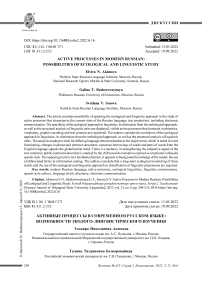Active processes in modern Russian: possibilities of ecological and linguistic study
Автор: Akimova Elvira N., Bezkorovaynaya Galina T., Ionova Svetlana V.
Журнал: Вестник Волгоградского государственного университета. Серия 2: Языкознание @jvolsu-linguistics
Рубрика: Дискуссии
Статья в выпуске: 6 т.21, 2022 года.
Бесплатный доступ
The article considers possibility of applying the ecological-and-linguistic approach to the study of active processes that characterize the current state of the Russian language, text production, including electronic communication. The specificity of the ecological approach in linguistics, its distinction from the orthological approach, as well as the structural analysis of linguistic units are displayed, visible active processes that dominate in phonetics, vocabulary, graphic encoding and text creation are registered. The authors consider the usefulness of the ecological approach in linguistics, its distinction from the orthological approach, as well as the structural analysis of linguistic units. The analysis made provision for defining language democratization as the major trend, which is noted in word functioning, changes in phrase and sentence structures; numerous borrowings of words and parts of words from the English language support the globalization trend. There is a tendency in strengthening the subjective aspect of the text content in public communication that is marked bythe shift towards evaluative-expressive-emotional colloquial speech style. The opposing trend is text intellectualization, it appeals to background knowledge of the reader, the use of abbreviated forms in information coding. The authors conclude that a long-term ecological monitoring of these trends and the use of the ecological-and-linguistic approach to classification of linguistic phenomena are required.
Modern russian language, active processes, ecological linguistics, linguistic consciousness, speech style culture, language levels, discourse, electronic communication
Короткий адрес: https://sciup.org/149141656
IDR: 149141656 | DOI: 10.15688/jvolsu2.2022.6.16
Список литературы Active processes in modern Russian: possibilities of ecological and linguistic study
- Akimova E.N., 2016. Lingvoekologicheskaya in ter pr etatsiya aktivn ykh pr ocessov v sovremennom russkom yazyke [The Linguistic Interpretation of Active Processes in Modern Russian]. Vestnik Mariyskogo gosudarstvennogo universiteta [Vestnik of the Mari State University], no. 3 (23), pp. 40-44.
- Alexander R., Stibbe A., 2014. From the Analysis of Ecological Discourse to the Ecological Analysis of Discourse. Language Sciences, vol. 41, pp. 104-110.
- Ammon U., 2015. Die Stellung der deutschen Sprache in der Welt. Berlin, München, Boston, De Gruyter Publ. XVII, 1294 S.
- Barron C., Bruce N., Nunan D., 2000. Introduction. Knowledge and Discourse. Towards an Ecology of Language. Harlow, Pearson Education, pp. 1-12.
- Calvet L.-J., 2007. Approche sociolinguistique de l’avenir du français dans le monde. Hérodote, no. 3 (126), pp. 153-160.
- Couto H.H. do., 2014. Ecological Approaches in Linguistics: A Historical Overview. Language Sciences, vol. 41, pp. 122-128.
- Epstein M., 2007. O tvorcheskom potentsiale russkogo yazyka. Grammatika perekhodnosti i tranzitivnoe obshchestvo [On Creative Potential of Russian Language. Transitivity Grammar and Transitive Society]. Znamya, no. 3, pp. 193-208.
- Garner M., 2005. Language Ecology as Linguistic Theory. Kaijian Linguistik dan Sastra, vol. 17, no. 33, pp. 91-101.
- Haugen E., 2001. The Ecology of Language. Fill A., Mühlhäusler P., eds. The Ecolinguistics Reader: Language, Ecology and Environment. London, Continuum International Publishing Group, pp. 57-66.
- Ionova S.V., 2016a. Lingvistika novogo yazykovogo soznaniya i informatsionnykh tekhnologiy [The Linguistics of Innovative Language Conciseness and Informatics Technology]. Vestnik Volgogradskogo gosudarstvennogo universiteta. Seriya 2. Yazykoznanie [Science Journal of Volgograd State University. Linguistics], vol. 15, no. 3, pp. 6-16. DOI: https://doi.org/10.15688/jvolsu2.2016.3.1
- Ionova S.V., 2016b. O dvukh aspektakh ekolingvisticheskikh issledovaniy [On Two Aspects of Ecolinguistic Studies]. Ekologiya yazyka i kommunikativnaya praktika [Ecology of Language and Communicative Practice], no. 1 (6), pp. 10-25.
- Ivanova E.V., 2007. Tseli, zadachi i problem ekolingvistiki [Aims, Tasks and Challenges of Ecological Linguistics]. Pragmaticheskiy aspect kommunikativnoy lingvistiki i stilistiki [Pragmatic Aspect of Communicative Linguistics and Stylistics]. Chelyabinsk, Obrazovanie Publ., pp. 41-47.
- Kibbee D., 2003. Language Policy and Linguistic Theory. Language in Globalizing World. Cambridge, Cambridge univ. press, pp. 47-57.
- Likhachev D.S., 1997. Kontseptosfera russkogo yazyka [The Concept Sphere of the Russian Language]. Neroznak V., ed. Russkaya slovesnost. Antologiya. Moscow, Academia Publ., pp. 279-288.
- Malin ski T., 19 92. Vozn i kn oven ie n ovykh frazeologicheskikh edinits [Emergence of New Phraseological Units]. Rusistika, no. 2, pp. 67-76.
- Marusenko M.A., 2015. Evolyutsiya mirovoy sistemy yazykov v epokhu postmoderna: Yazykovye posledstviya globalizatsii [Evolution of World System of Languages in the Postmodern Epoch: Globalization Inference on the Language]. Moscow, VKN Publ. 496 p.
- Nelde P., 1989. Ecological Aspects of Language Contact or how to Investigate Linguistic Minorities. Journal of Multilingual and Multicultural Development, vol. 10, no. 1, pp. 73-86.
- Radbil T.B., 2008. Innovatsionnye protsessy v leksike i grammatike russkogo yazyka Interneta [The Innovation Process in Vocabulary, Grammar of the Russian Internet Language]. Croatica et Slavica Ladertina, no. 4, pp. 240-244.
- Salikoko S.M., 2020. Globalization and the Myth of Killer Languages. URL: http://mufwene.uchicago.edu/publications/ globalization-killerLanguages. pdf
- Sapir Е., 1912. Language and Environment. American Anthropologist. New Series, vol. 14, no. 2, pp. 226-242.
- Shakhovskiy V.I., ed., 2013. Emotivnaya lin gvoe kolo giya v s ovre menn om kommunikativnom prostranstve [Emotive Linguistic Ecology in Modern Communicative Area]. Volgograd, Peremena Publ. 450 p.
- Sirotinina O.B., 2013. Russkiy yazyk: sistema, uzus i sozdavaemye imi riski [Russian: System. Usus, and Appearing Risks]. Saratov, Izd-vo Sarat. un-ta. 116 p.
- Skovorodnikov A.P., 1992. Ob ekologii russkogo yazyka [About the Ecology of the Russian Language]. Filologicheskie nauki, no. 5/6, pp. 104-111.
- Thomason S.G., 2001. Language Contact Publisher. S.l., Edinburgh University Press. 320 р.
- Zifonun G., 2018. Die demokratische Pflicht und das Sprachsystem: Erneute Diskussion zu einem gesellschaftsgerechten Sprachgebrauch. Sprachreport, Jg. 34, S. 44-56.
- Verbitskaya L.A., 2001. Davayte govorit pravilno [Let Us Speak in a Right Way]. Moscow, Vyssh. shk. Publ. 239 p.
- Yakhnych M.A., Ionova S.V., 2013. Obrashchenie kak pr oyavl enie rechevoy kultury v internet-kommunikatsii [Addressing as Manifistation of Speech Culture in the Internet Communication]. Ekologiya yazyka i kommunikativnaya praktika [Ecology of Language and Communicative Practice], no. 1, pp. 246-256.


